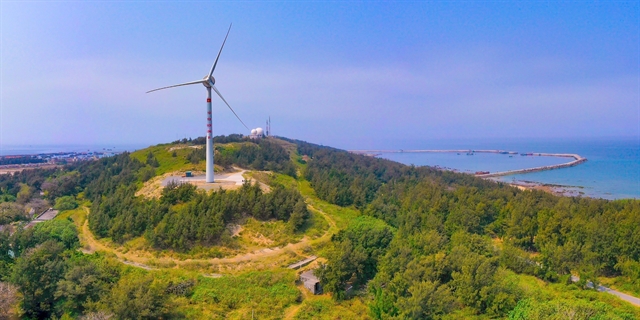 Opinion
Opinion

 |
| A wind power project on Bạch Long Vĩ Island, northern port city of Hải Phòng. — VNA/VNS Photo Đức Nghĩa |
HÀ NỘI — Germany has been working with many vocational colleges in Việt Nam, support the development of curricula and training on specific skills related to renewable energy such as the installation of solar rooftops, Dr. Guido Hildner, German Ambassador to Việt Nam, told Việt Nam News in a recent interview.
He said the energy transition is a complex and demanding process, but also provides great opportunities to the people and the economies. And Việt Nam is not an exception.
He said there are a lot of projects involved in human resources, job skills, and vocational training, which are key components of the two countries’ cooperation.
Noting that Việt Nam has set a target of net-zero emissions by 2050, the diplomat said that Germany has supported Việt Nam in employment transition by training Vietnamese workers in the fields of electricity, electronics and roof-top solar power installation.
Each year, tens of thousands of Vietnamese students are trained in 11 vocational training facilities, 79 per cent of whom have been employed, he said.
“We have many interesting projects and cooperation between Germany and Việt Nam, for instance, the recruitment of skilled labourers for the German labour market. Germany is interested in recruiting Vietnamese skilled labourers,” he said.
Highlighting that energy has been a focus of Việt Nam-Germany development cooperation, he said: “We have a huge set of projects with Việt Nam in solar energy. We share our experience with the Government, give advice on modernisation of the grid and energy efficiency.”
“We all know that climate change is affecting everybody on Earth. Việt Nam is a country that is particularly affected by the consequences of climate change. So it is in the interest of Việt Nam, of the whole country, of all the people, of the economy to also adapt and minimise the effects of climate change.”
Phasing out fossil fuels is central to the future of a healthy and prosperous Việt Nam, he said.
Sharing the energy transition from Germany, he said: “Start as soon as possible with the energy transition. The earlier you do it, the better it is. Because it will give you an advantage if you start early, so don't wait.”
According to the draft National Power Development Plan, by 2045, the whole country will have over 75 per cent renewable energy. Current studies also show that, in the fields of wind and solar energy, about 25 per cent of jobs created are for high-skilled workers.
The Just Energy Transition Partnership (JETP) was adopted by Việt Nam and International Partners Group (IPG) on December 14, 2022 in Brussels. Việt Nam is the third country, after South Africa and Indonesia, to ratify the JETP with countries inside and outside the G7.
International partners joining in the JETP with Việt Nam include the European Union, Great Britain and Northern Ireland, United States, Japan, Germany, France, Italy, Canada, Denmark and Norway. — VNS




